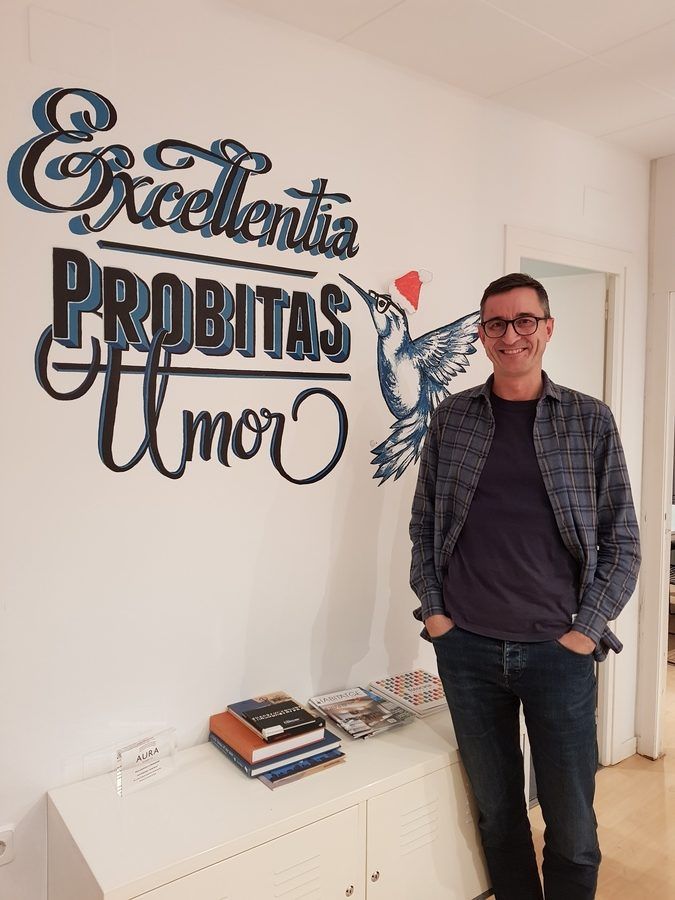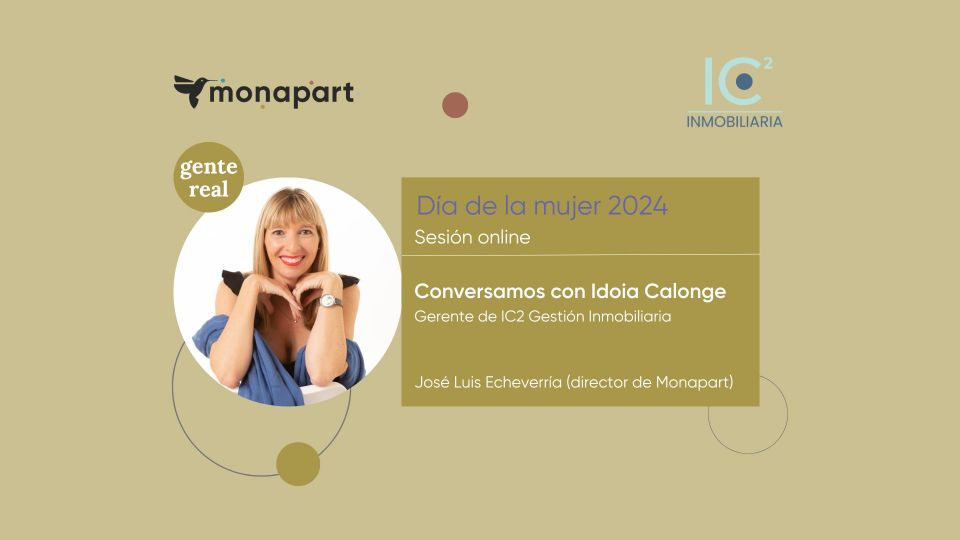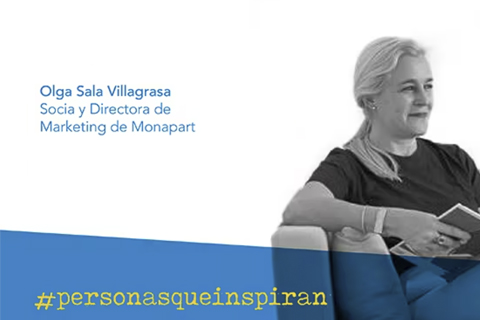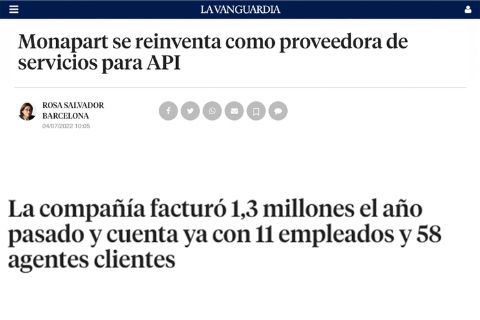Interview with José Luis Echeverría in the Habitatge Sarrià magazine.
[Translation of the interview in Catalan published in Habitatge Sarrià-Sant Gervasi].
José Luis Echeverría, one of the three founding partners of Monapart, welcomes us amicably in the agency's offices, on the 16th floor of Gal-la Placídia with wonderful views of Barcelona. A modern space with a taste for advertising and design that they have managed to grow with their partners, Eduard Solé and Olga Sala.

Question: What are an architect, a journalist and a lawyer doing setting up a real estate agency?
Answer: The real estate sector is a sector of people who are taken in! There are few agents who were real estate agents as their first profession, I know very few. Most of us come from other professions: law, psychology, architecture and business. Eduard and I met while studying at ESADE. He was a journalist, but the son of a developer, already thinking in terms of real estate, and I was an architect. I started to work with him on some commissions. Talking, we came up with Monapart, which was very closely linked to content creation. Olga Sala, who is the third partner, was the person closest to us who knew the world of digital content technology..., so we incorporated her and she became essential.
And, moreover, at the worst time for the sector.
Yes, but that is relative. It was a time with little operation, but with very little competition. Good practices were more valuable, there was very little innovation. We came in with new blood and a desire to do things, and it went well, we didn't think about the context. We thought that when things improved, we would do better, and we did. Not exponentially, because there have also been more people. I think it was the right time.
What were the beginnings like?
Monapart has grown every year, and the first few years were the ones with the fastest growth, although it was hard. It was the beginning of a lot of work, obviously. I think it cost us what it costs anyone to start a company from scratch in a sector they don't know, and also at a complicated time.
Did not being knowledgeable about the sector benefit you?
Absolutely. We have had to learn some things, and in others we have had the good fortune to have no reference points and to invent things. The first, positioning: to occupy a market niche that nobody else was occupying, what is commonly known in the sector as "homes with charm". Interesting, special homes... It is not luxury, but taste. More based on lifestyle, relationship with the home. When we arrived, there was only luxury and the rest, and there were no middle agencies. Our second contribution has been to apply tools more associated with mass consumption and other types of services. We have been very market-driven, very digital from the very beginning. We have been very focused on attracting who we want to attract, because we don't want all clients either, only those we understand. We have few customers at the same time, but we take good care of them.
Do you have to turn customers away?
The real estate sector is a shabby one, everyone looks over their shoulders. Professionals fight to be chosen, and we, like everyone else, also choose. Because we go at risk! The client pays us if we succeed. A poorly chosen client is a major waste of resources. In some respects, the agent-client relationship is more like a partnership than a supplier-client. It also has obligations. Sometimes we know that there are many options to fail with a proposal, so we prefer to say no at the outset, and not look bad afterwards.
"We have been lucky enough to have no reference points and to make things up".
Your philosophy is not only to sell flats, but also stories.
It is a means, it has an end component, but it is the way we sell homes, because there is always a soul behind a house. This makes the work and the relationship with the client more fun and more complicit. Selling the property at the highest possible price within the agreed time is the objective, obviously, but it can be done in many ways, and this is the one that seems most humane in a sector that has traditionally worked with its back turned to this aspect.
You have been expanding over the years, how are you today?
We have eleven offices in eight cities. People have been discovering Monapart. We always say that we are the first and only agency with fans [laughs], and where we have the most is in the world of agents. And people have been contacting us because they were looking for options to open a franchise, because they were seduced by the idea. We are the franchise and real estate for people who don't like franchises or real estate. Most of our partners are architects.
Where is real estate marketing heading?
I think there will be two leagues: the large companies, the proptechwith an important technological edge. They are technology companies within the real estate sector, not the other way around, and therefore there will be a marketing of the technology sector companies, with resources, fresh, omnipresent. And then there will be the second league, in which there will be more or less level. Most real estate agencies are shops, small businesses with scarce resources that cannot afford to have advertisers or a marketing director. Two things can happen to Monapart: either we will climb up to the stars, where we want to be, or we will become the rara avis among traditional agencies.
You are also involved in Up Barcelona, how does it work?
It works well. I think it is the MLS that works best in the city, because it is non-hierarchical. In the end we are an association that shares sellers and buyers. There is a very good part of members, a bad part and an average part. There is a bit of everything, but because there are relationships of trust and no external leadership, we are almost a cooperative. And it works well. The upper area of Barcelona doesn't know it, but this is a great instrument for them. It is kept semi-hidden, carrying out its operations, because it should not have repercussions, its members should.
New rental conditions came into force at the end of December, how does this affect you?
I don't know whether this is good or bad news. A priori, there is good news for the tenant, the big victim nowadays in cities like Barcelona. In the short and medium term, for the Barcelona market? Who knows. Some say that the new conditions could penalise and lead to an increase in rents... I wouldn't know what the result will be. I don't even think that the government itself is clear about the objective of all this. The measures have a certain populist tinge. Mr Pep and Mrs Maria are the majority owners in Barcelona, and they are the ones who decide the price. There is no rental bubble, there is a Barcelona bubble. We have become a city that attracts the financial director, the engineer, and expels the philologist and the veterinarian. And this is not done by real estate agencies or companies, it is done by the dynamics of the city itself, as has happened in other cities in Europe and the world. This goes beyond housing, and it hurts me because I am beginning to assume that my children will not be able to live in Barcelona, depending on the life they choose.
PROFILE
- A moment of the day:
- Before the sun rises, when others are asleep.
- One plate:
- A T-bone steak (plain, bareback).
- Last book read:
- The Medium is the Massage (Marshall McLuhan & Quentin Fiore, 1967).
- Series or film:
- Film, Blade Runner (Ridley Scott, 1982).
- A hobby:
- I don't have one... Walking and reading come closest.





